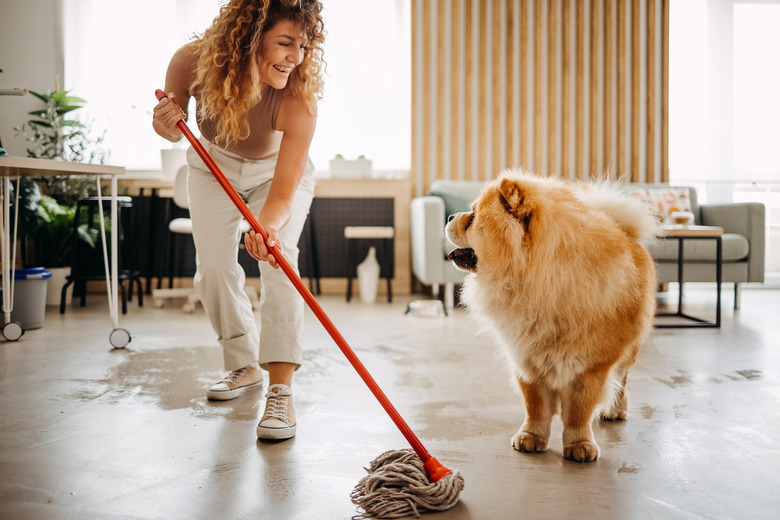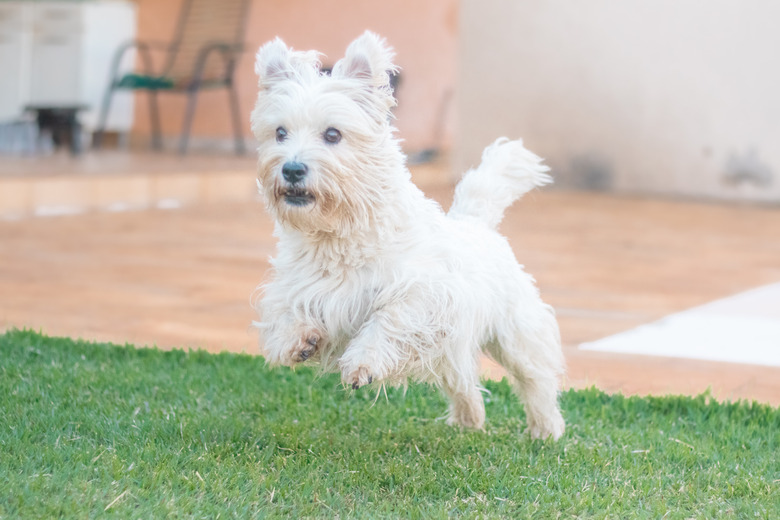How To Sanitize After Your Dog Has Worms
Most dogs will have worms at some time in their life. Puppies can be born with worms, and dogs may become infected after contact with other pets or from playing in the park. Some of these parasites are transmissible and can cause illness in humans. Thorough cleaning after dogs have had a worm infection is essential in reducing the risk of transmission to people and pets.
Common worm infections in dogs
Common worm infections in dogs
The most common worm infections in dogs include roundworm, tapeworm, hookworm, whipworm, and heartworm. All these worms are preventable and treatable. Roundworm, hookworm, whipworm, and tapeworm are intestinal parasites that can be transmitted within the home. Heartworm is a parasite that lives in a dog's heart and lungs and is transmitted between dogs by mosquitos.
Can dog worms live in the home on carpets, furniture, and surfaces?
Can dog worms live in the home on carpets, furniture, and surfaces?
Yes, worms can live in carpet, furniture like dog beds, and on some surfaces. It is always better to prevent a parasite infection in dogs than to treat it and sanitize your home after infection occurs. Understanding the life cycle of the different types of worms that can be passed to other dogs or people within the home and how they are transmitted will help pet owners reduce the risk of infections.
Cleaning up after roundworms in dogs
Cleaning up after roundworms in dogs
Dogs catch roundworms by ingesting larvae from infected feces or eating other animals that have ingested larvae. Roundworm larvae normally mature in the dog's small intestine but can migrate to other parts of the dog's body and become cysts. A female dog can pass these cysts to puppies in utero, which is why some puppies are born with roundworm infections. If a person ingests roundworm larvae through contact with infected feces, they can also experience larval migration and cysts that can cause serious health problems, especially in children. Roundworm eggs can live in your carpet, on floors, and on other surfaces in your home.
Cleaning up after tapeworms in dogs
Cleaning up after tapeworms in dogs
Tapeworm eggs, which look like grains of rice in a dog's stool or around their anus, are eaten by flea larvae. When dogs groom themselves, they can ingest infected fleas. Although the most common tapeworm in dogs, Dipylidium caninum, rarely infects humans, other less common tapeworm species can cause illness in those who have eaten infected meat or accidentally ingested feces carrying tapeworm eggs. Tapeworm eggs can live in your carpet, on furniture, and even on dust in your home.
Cleaning up after hookworms in dogs
Cleaning up after hookworms in dogs
Hookworm eggs are passed in the stool of infected dogs, where the larvae hatch and can live for weeks or months waiting for a host. Dogs may ingest the larvae when grooming or pick them up when sniffing other dogs' poop. Hookworm larvae can also burrow through the skin of the feet if dogs walk on contaminated soil. Some puppies catch hookworms from their mother's milk or in utero.
Adult hookworms cannot survive in humans, but larvae may enter the body by burrowing through the skin. Normally, this only causes itching and irritation, but in some cases, if they migrate into other parts of the body, they can cause serious illness. Hookworm larvae can live in soil for several months, but routine household cleaning makes it difficult for them to survive in a home environment for long.
Cleaning up after whipworms in dogs
Cleaning up after whipworms in dogs
Whipworm eggs are passed when a dog defecates. They are highly transmissible to other dogs and become infectious 10 to 60 days after being passed. They can remain infectious outside a dog's body for up to five years. A female whipworm starts laying eggs within 12 weeks of maturing. Diagnosis can be difficult, but treatment is essential since they can cause severe illness in dogs, such as anemia. Whipworms are not transmissible to humans, but they have a high rate of reinfection in dogs. The eggs are microscopic and can live in carpets, on furniture, or on other surfaces in a house.
How do I clean my house after my dog has worms?
How do I clean my house after my dog has worms?
Once your dog or puppy has been wormed, there is a risk of reinfection or in some cases, transmission to humans if live eggs or larvae remain in the home environment. Therefore, it is essential to ask your veterinarian which intestinal parasites will require thorough cleaning of your home and yard to prevent reinfestation. Here are some guidelines:
- Practice good hygiene. Follow strict hygiene rules, including hand washing with soap and water, especially after contact with pets or their feces. Remove shoes before entering the house and prevent children from playing in areas where an infected dog may have toileted.
- Treat other pets. All household pets should be tested and treated for worms and prevented from having access to infected feces.
- Clean the carpet and floors thoroughly. Worm eggs can be very resilient and difficult to kill, even with bleach or disinfectants. Heat is considered the most effective way to kill worm eggs, so after vacuuming carpets and areas where the dog rests, steam clean. Mop with a diluted bleach solution of 3 cups per gallon of water, as this will dissolve the outer sticky layers of any remaining worm eggs to make it easier to wipe them away.
- Sanitize other household surfaces. According to the Saudi Medical Journal, acetic acid, found in vinegar, has been shown to kill roundworm eggs, so wipe all surfaces with very hot, soapy water and vinegar.
- Clean pets' bedding, food, bowls, and toys. Bowls and toys can be cleaned with hot water and a vinegar solution. Wash and dry all dog beds at a high temperature. Never shake them inside the house, as this can spread eggs onto other surfaces.
- Maintain good cleaning practices. To reduce the reinfection risk, follow hygiene rules around pets, vacuum daily, and mop and wash dog bedding weekly. In the case of tapeworms, you will also want to use an effective household flea infestation treatment and a long-lasting, veterinarian-approved flea preventative medication for your pets.
- Trash the poop. Remove and dispose of your dog's poop quickly, wearing gloves and using waterproof bags. If they are shedding worms, these can easily contaminate the soil in your yard or park.
- Decontaminate your yard. Borax and food-grade diatomaceous earth are safe and powerful drying agents, and if they are raked into the soil in your yard, they may help to kill worm eggs but can damage plants if used in large quantities.
- Deworm and test your dog regularly. Puppies can be started on dewormer from 2 weeks of age, which should be given every two weeks until any worm infections are gone. Ask your veterinarian for an appropriate deworming schedule for your puppy or dog. Heartworm medication must be given monthly and can also prevent whipworms. Have your veterinarian do a fecal test every six months to ensure they remain clear of worms.
The bottom line
The bottom line
Dog worms are transmissible to pets and can cause illness in humans. Using deworming medication, testing pets regularly, and following good hygiene practices can reduce these risks. If a dog does have worms, sanitizing your home and yard can reduce the chance of your dog being reinfected or transmission to other pets or family members.



